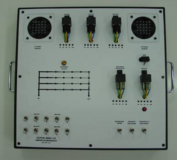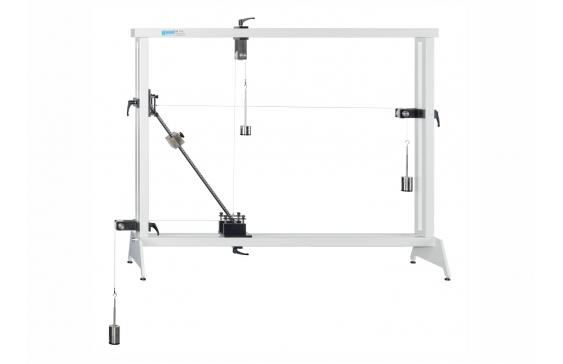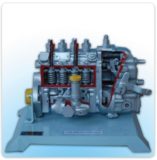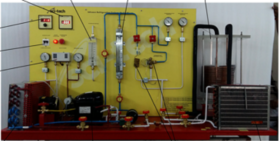Equilibrium in a Single Plane Apparatus Model MT 109
Home » Products » Equilibrium in a Single Plane Apparatus Model MT 109
Equilibrium in a Single Plane Apparatus Model MT 109
The principle of “freeing” in engineering mechanics allows forces and moments acting on a body to be made visible. In this process, a body or a system such as a bar are virtually removed from the environment. All forces acting on the body or on the system are replaced by standardized symbols. This results in a simplified model of the body or system, which clearly demonstrates the relationships between forces and moments. In the experiment with Sci-tech Equilibrium in a Single Plane Apparatus Model MT 109, we demonstrate the principle of “freeing”, which refers to establishing static equilibrium. The experiment uses a model of a ladder with a sliding clamp weight. The top support is designed as a movable support and the bottom one as a fixed support. The real effective support forces can be fully compensated by applying cable forces in the x and y directions. The ladder is in a state of equilibrium without changing the angular position and without the need for structural support. The ladder is “free”. For students, the result is a convincing example for the principle of “freeing” in statics. The parts of the experiment are clearly laid out and securely housed in a storage system. The entire experimental setup is constructed in the mounting frame.
| Size: | 110cm x 40cm x 95cm (LxWxH) |
| Weight: | 15 kg |
Item Description
The principle of “freeing” in engineering mechanics allows forces and moments acting on a body to be made visible. In this process, a body or a system such as a bar are virtually removed from the environment. All forces acting on the body or on the system are replaced by standardized symbols. This results in a simplified model of the body or system, which clearly demonstrates the relationships between forces and moments.
In the experiment with Sci-tech Equilibrium in a Single Plane Apparatus Model MT 109, we demonstrate the principle of “freeing”, which refers to establishing static equilibrium. The experiment uses a model of a ladder with a sliding clamp weight.
The top support is designed as a movable support and the bottom one as a fixed support. The real effective support forces can be fully compensated by applying cable forces in the x and y directions.
The ladder is in a state of equilibrium without changing the angular position and without the need for structural support. The ladder is “free”. For students, the result is a convincing example for the principle of “freeing” in statics.
The parts of the experiment are clearly laid out and securely housed in a storage system. The entire experimental setup is constructed in the mounting frame.
See also different:

SYSTEM FEATURES - Defroster and Control Circuit. - Two (2) Cooling Fans w/ Relays. - Ten (10) Real World Faults for Diagnosis. - Test Points for Diagnosis and Troubleshooting



